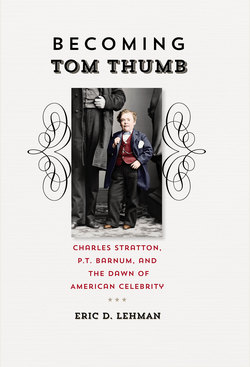Читать книгу Becoming Tom Thumb - Eric D. Lehman - Страница 13
На сайте Литреса книга снята с продажи.
ОглавлениеBUTTONS, BULLFIGHTS, AND BALLOONS
Charles was part of a strange family now. It consisted of a dozen or so members, some of which changed every few weeks. Along with a variety of musicians and actors, H. G. Sherman, the “antiquarian” was always there, as well as his parents, a man named Lawson, and Professor Pinte the interpreter. A troupe of ponies and horses completed the entourage. The family traveled from town to town through France during the “vintage season,” with its “vineyards loaded with luscious grapes and groves of olive trees in full bearing.”1 At the inns Charles slept most often in rooms with two beds, one for his parents, and one for him. He “wished” his meals served in his own apartment, or more likely his parents wished it because they didn’t want people to see him for free in the inns’ dining rooms.2 Food was expensive, since a potato blight and poor grain crops had driven up prices, and while some towns seemed to be thriving, others seemed trapped in poverty and unemployment.
When they stopped in towns Charles would perform, sometimes twice a day and occasionally even three times. During the daytime he usually gave exhibitions in “citizen’s dress” and at night in costume.3 He had added the character of Prussian ruler Frederick the Great to his repertoire by now, tottering around like an old man to the howls of the audience. He had stayed healthy so far, never catching a cold or getting a stomachache from the strange food, and despite performing some acrobatics and dancing on the edge of platforms, he had not fallen or had any sort of accident. When he was not performing, he was learning French from Professor Pinte, playing the piano and violin, or reading and writing in his rooms, pastimes which he used to hate, but now began to enjoy.4
The strangest member of this strange family was P. T. Barnum, a weird, uncle-like fellow who had been around almost every day for as long as Charles could remember, teaching him routines and acting with him in skits. Now, Barnum would travel a week ahead to secure the engagements, advertising the performances and building up the public’s anticipation. When arranging lodging for the troupe, he made sure his star performer had “got a snug saloon to draw and read in next to the bedroom.”5 The boy also collected old buttons he found and gave them to Barnum, who paid him four francs each for them.6 This charming exchange became one way to keep connected over the miles. The showman continued to take an interest in the child’s education, goading and bribing him into learning the way parents often must: “Don’t let General learn that French song, for I bet Pinte [his tutor] that he would not learn it before he got to Bordeaux. I expect the little rascal will learn it, just to make me lose my hat.”7
And Barnum thought of more than just Charles’s education. In Poitiers he suggested that “the General” should walk the promenade on the old walls of the town, simply because he thought he would enjoy it.8 In his letters, he consistently expresses concern for Charles’s well-being, and refused to let Charles perform after nine in the evening, even for extra money. And of course, he continued to praise Charles, in private as well as in public, calling him “a trump.”9 In a letter to the playwright Albert Smith, he urged him to challenge the boy. “It is no matter how much you put in for him to do, or say, or sing—he can do anything that any actor can do—he has got a first rate idea of the comic—and he can come the pantomime to any extent, and talk as much as you please.”10
When the showman and his protégé crossed paths, they delighted in each other’s company. Barnum sat him on his lap and told him stories, mostly nursery rhymes. One day, while telling “Ali Baba and the Forty Thieves,” the showman saw a chance to cure Charles of his natural childish selfishness. Just as Ali Baba said “Open Sesame” and revealed the cave full of gold and jewels, Barnum fell silent.
“Go on,” said the General, his eyes sparkling with curiosity.
I said, “Oh, no, General. I am sleepy and cannot tell any more tonight.”
“Oh, go on,” said he, “go on.”
I yawned and said, “No, not to-night, General.”
“Now, Mr. Barnum, go on, go on, and let me hear the rest of it.”
“I am not going to be compelled to tell you the story to-night, when I am sleepy.”
“Oh, now, don’t be so mean, Mr. Barnum, go on.”
“Well, give me a quarter of a dollar, and I will finish the story.”
Charles “shuddered” but finally gave him a quarter, saying “I must hear the last of that story, but please don’t ever play such a trick as that on me again.” From then on, the boy always checked to make sure that when Barnum started a story there would be no required payment for the ending.11
